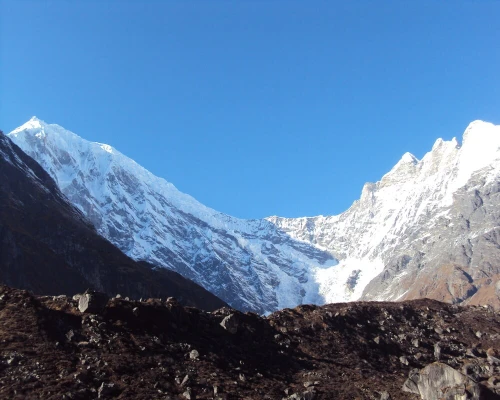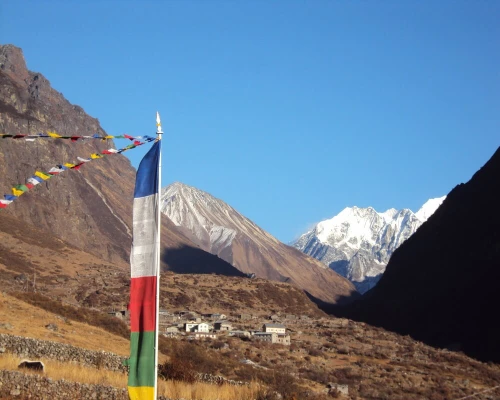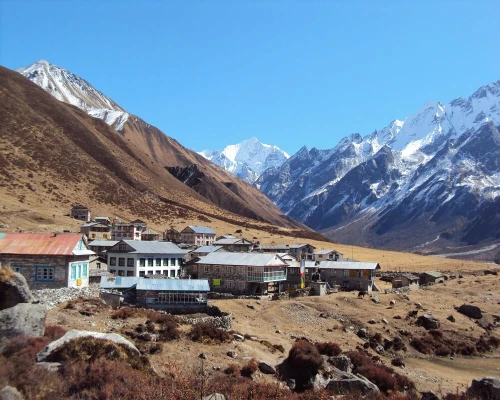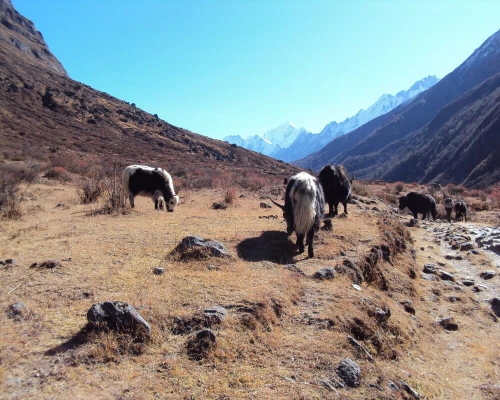Experience Required:
Yes correct. For the Langtang Ganjala Trek, prior trekking experience is not necessary. It is considered a moderate trek suitable for beginners and individuals with a good level of fitness. However, it is important to be in good health and physically prepared for the trek, as it involves several days of walking in varying terrains and altitudes. Regular exercise and stamina-building activities prior to the trek can help in ensuring a more enjoyable and comfortable experience. Additionally, it is always advisable to consult with a healthcare professional before embarking on any physical activity or trekking adventure.
Pre-Trip Meeting:
Yes, participating in a pre-trip meeting is a common practice before embarking on the Langtang Ganja La Pass Trekking or any other trek in Nepal. The pre-trip meeting usually takes place in Kathmandu, either at the trekking agency's office or at the hotel where you are staying. It is typically held in the first few days of your itinerary.
During the pre-trip meeting, the trekking agency or guide will provide important information about the trek, including the itinerary, route details, safety precautions, and necessary equipment. They will also introduce the trek leader and give you an opportunity to ask any questions you may have. It is a valuable session where you can gather information, clarify doubts, and get to know your fellow trekkers.
Attending the pre-trip meeting is highly recommended as it helps ensure that everyone is well-prepared and aware of what to expect during the trek. It is also a chance to meet your trekking team and establish a sense of camaraderie before setting off on the adventure.
Equipment Check List:
We are providing you the list of equipment required for the Langtang Ganja La Pass Trekking. It's essential to pack wisely and make sure you have all the necessary items for a comfortable and safe trekking experience. Here is a summary of the equipment you mentioned:
Head:
- Sun hat or scarf
- Light balaclava or warm fleece hat
- Sunglasses with UV protection
- Lower Body:
- Undergarments
- Hiking shorts
- Lightweight cotton long pants
- Lightweight hiking thermal bottoms
- Fleece or wool pants
- Waterproof trekking trousers
Feet:
- Lightweight thin inner socks
- Thick, warm wool hiking socks
- Hiking boots with spare laces
- Camp shoes
- Gaiters (optional)
- Upper Body:
- Hiking and lightweight thermal tops
- Fleece jacket or pullover
- Fleece Wind-Stopper jacket (optional)
- Waterproof shell jacket
- Down vest and/or jacket
- Base layer shirts
- Warm jacket (down)
Hands:
- Lightweight gloves
- Heavyweight gloves or mittens with a waterproof shell outer
Accessories:
- Sleeping bag (comfort rated -10ºC)
- Sleeping bag liner
- Head torch with spare bulbs and batteries
- Small pad or combination lock
- Large bag for keeping items dry inside trek bag
- Daypack (250 to 30 liters)
- Thermarest sleeping pad
- Water bottles
- Water purification tablets
- Basic First Aid Kit:
- Antiseptic cream
- Throat lozenges
- Diarrhea treatment (Imodium)
- Altitude sickness medication (Diamox)
- Painkillers
- Plasters and blister treatment
- Insect repellent
- Rehydration salts (Dioralite)
- Glucose tablets
- Multi-vitamin tablets
Toiletries:
- Medium-sized quick-drying towel
- Toothbrush/paste
- Multipurpose soap
- Deodorants
- Nail clippers
- Face and body moisturizer
- Feminine products
- Small mirror
- Wet wipes
- Toilet roll/tissue
Extras:
- Antibacterial hand wash
- Luxuries:
- Binoculars
- Reading book
- Trip Map/Guide book
- Trekking poles
- Camera
- Repair kit (needle, thread, duct tape)
It's important to note that the list may vary depending on personal preferences and specific requirements. Make sure to consider the weather conditions and duration of the trek when packing your equipment. Additionally, consult with your trekking agency or guide for any specific recommendations they may have for the Langtang Ganja La Pass Trekking.
A typical day:
After a refreshing wake-up call, you'll have the opportunity to witness the beautiful morning scenery while enjoying a delicious breakfast. Once you're energized and ready to go, you'll pack your belongings and begin the day's trekking adventure. The trail will lead you to new destinations and experiences.
During the trek, you'll have a well-deserved lunch break at a suitable spot along the way. This gives you a chance to rest, refuel, and replenish your energy for the remainder of the journey. After lunch, you'll continue trekking for several more hours, immersing yourself in the natural beauty of the surroundings.
In the afternoon, you'll reach your destination for the day. It could be a cozy lodge or a camping site, depending on the trek and itinerary. Once you arrive, you'll have the opportunity to relax, unwind, and make yourself comfortable for the night. Whether it's a comfortable bed in a lodge or a well-prepared camping setup, you'll have a peaceful sleep to rejuvenate for the next day's adventures.
This routine of waking up early, enjoying breakfast, trekking, having lunch, continuing the trek, and reaching the destination for the night is a typical pattern followed during trekking journeys. It allows you to make the most of your time, experience the beauty of nature, and have a comfortable place to rest and recharge each night.
Meals and Accommodation:
During the Langtang Ganja La Pass Trek, it's important to note that the availability of daily meals and accommodations may be limited compared to more developed areas. The trek takes you through remote and less populated regions, where the facilities are basic and resources are limited.
In terms of meals, you can expect simple and nourishing food options that are commonly available along the trekking route. Typical meals include rice, lentils, vegetables, noodles, bread, eggs, and some meat options such as chicken or yak meat. Local teahouses or lodges usually provide these meals, and they cater to trekkers' needs with basic yet satisfying menus. It's advisable to be open-minded and flexible with your food choices, as the variety may be limited compared to urban areas.
Regarding accommodations, you'll primarily stay in teahouses or lodges along the trekking route. These are basic lodgings that offer rooms with twin sharing beds or dormitory-style arrangements. The rooms may have communal bathrooms with shared facilities like squat toilets and basic washing areas. Keep in mind that the amenities and comfort levels are modest, as the focus is on providing a safe and sheltered place to rest during the trek.
It's essential to be mentally prepared for the rustic nature of the accommodations and the limited menu options. Embracing the simplicity and appreciating the natural beauty of the surroundings can enhance your trekking experience. Additionally, it's advisable to carry some energy bars, snacks, and water purifying tablets to supplement your meals and ensure your hydration needs are met.
Insurance:
Yes, Nepal Nomad recommends that all participants of the Ganja La Pass trek have proper medical insurance, trip cancellation insurance, and emergency evacuation insurance. These insurance policies are important to ensure your safety and well-being during the trek.
Medical insurance provides coverage for any medical expenses or emergencies that may arise during the trek. It is important to have adequate coverage for potential injuries, illnesses, or altitude-related conditions. Make sure your insurance policy includes coverage for high-altitude trekking and emergency medical evacuation.
Trip cancellation insurance is essential as it protects you financially in case you need to cancel or interrupt your trip due to unforeseen circumstances. This can include personal emergencies, natural disasters, or other events that may prevent you from participating in the trek. Trip cancellation insurance can reimburse you for non-refundable expenses such as flights, accommodations, and trekking permits.
Emergency evacuation insurance is particularly crucial for treks like Ganja La Pass, which take place in remote and rugged terrain. In the event of a serious injury or medical emergency that requires evacuation by helicopter or other means, this insurance covers the costs associated with the evacuation. It provides peace of mind knowing that you will receive prompt and necessary medical assistance in case of emergencies.
It is important to carefully review the terms and coverage of your insurance policies to ensure they meet the requirements of the trek. Check if they cover activities at high altitudes, trekking in remote areas, and emergency evacuation by helicopter if needed. Also, carry a copy of your insurance policy and emergency contact numbers with you during the trek.
Having the proper insurance coverage not only protects you but also ensures that you can receive the necessary medical care and assistance in case of any unforeseen events or emergencies during the Ganja La Pass trek.
Altitude Sickness:
It is a wise decision. Proper acclimatization is crucial when trekking in high-altitude regions like Ganja La Pass. Altitude sickness, also known as acute mountain sickness (AMS), can occur when ascending too quickly to high altitudes without giving your body enough time to adjust.
By including rest and acclimatization days in your trek itinerary, you allow your body to gradually adapt to the increasing altitude. These rest days are essential for reducing the risk of altitude sickness and ensuring your overall safety and well-being during the trek.
During rest days, it's important to take it easy and avoid strenuous activities. Instead, you can use this time to explore the surroundings, enjoy the scenic views, and immerse yourself in the local culture. It's also recommended to engage in light exercises and short hikes to higher elevations, which helps your body acclimatize more effectively.
By providing ample time for rest, exploration, exercise, and acclimatization, you give yourself the best chance to acclimate properly and minimize the risk of altitude sickness. It's important to listen to your body, pay attention to any symptoms of AMS, and communicate with your trekking guide or team if you experience any discomfort or signs of altitude sickness.
Remember to stay hydrated, eat nutritious meals, and follow the guidance of your experienced trekking team. Their knowledge and expertise will help ensure a safe and enjoyable trekking experience in the Ganja La Pass region.






